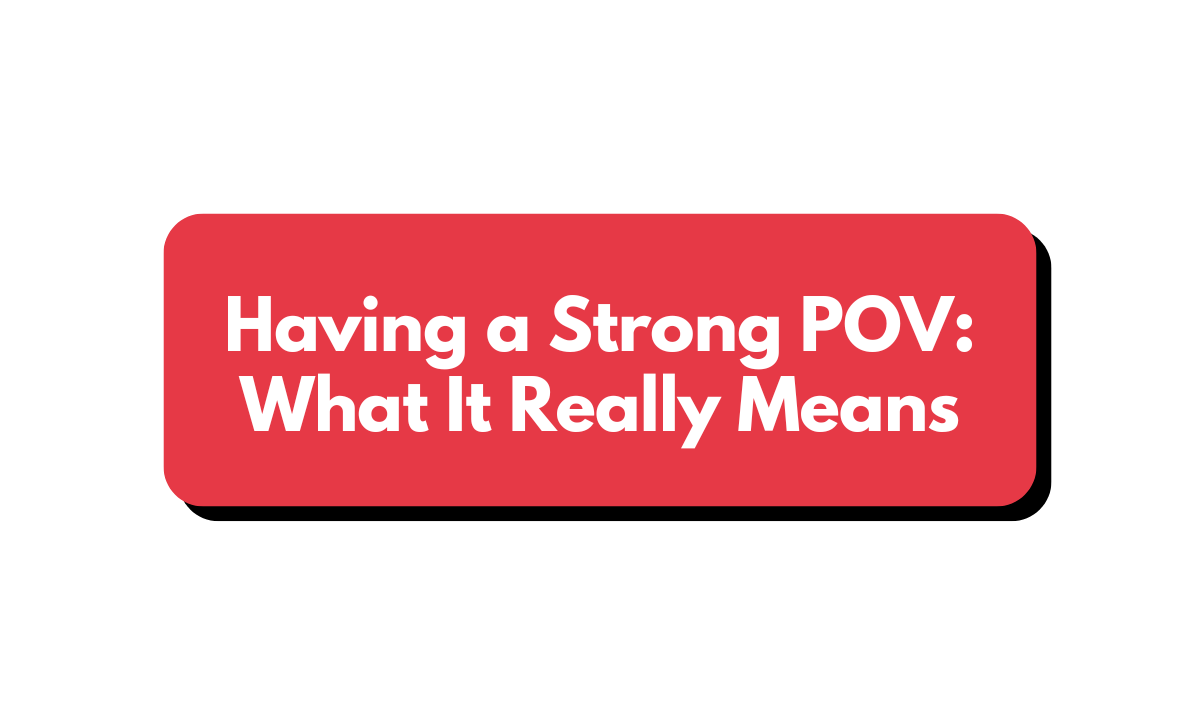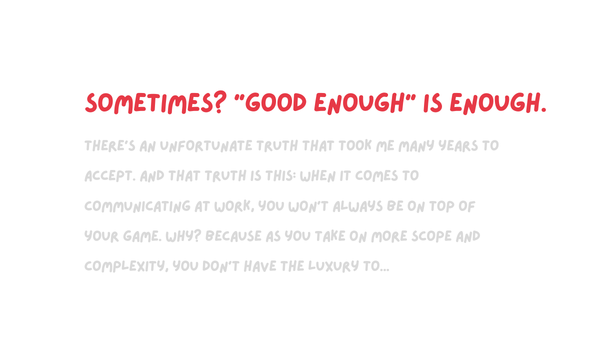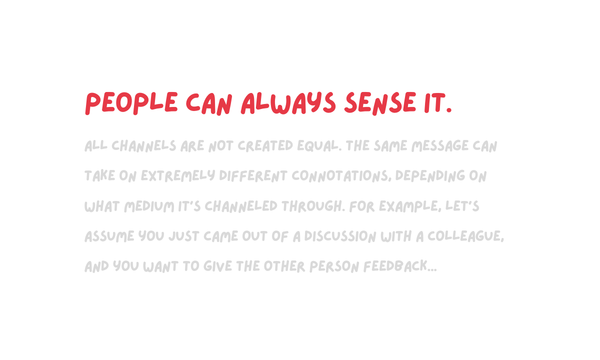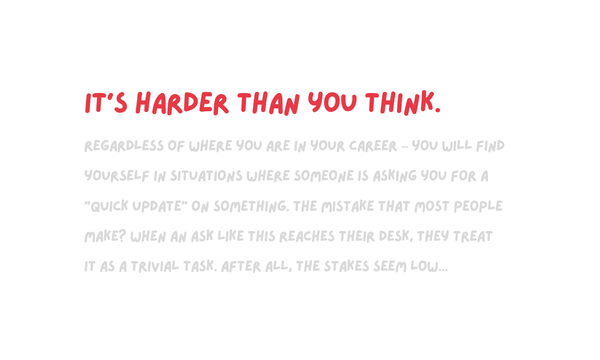🧠 You don't need to be smart. But you need a strong point of view.

One thing I notice about my Google colleagues with accelerated careers? They train themselves to do one thing extremely well:
They constantly push themselves to develop a strong point of view (POV).
Because here’s the thing. It doesn’t matter if you’re "just" an analyst. It doesn’t matter if you’re "just" looking after a small part of the business. It doesn’t matter if you think your job is "just" to execute well...
Doing that will only get you so far.
Instead, to make that eventual career leap, you need to learn how to influence. And you need to start setting direction for others. All of that flows directly from having a strong POV.
But before we talk about what a POV is – let’s talk about what it is NOT.
👋 Join 4500+ readers and subscribe to Herng's Newsletter for free:
Having a strong POV: what it isn't
Let’s take a simple example. Imagine that your friend runs a lemonade stand, but sales have been stagnant for months. She then comes to you for advice on how to solve this problem.
Here are 3 common behaviors that resemble having a strong POV, but actually don’t count:
- False confidence
- Contrarian-ness for the sake of it
- Unassailable statements or hypotheses
Let's go through them one by one.
#1 False confidence.
Here are some examples of false confidence:
- I'm pretty sure it's because our prices are too high.
- It's a seasonality issue; I guarantee sales will pick up soon.
- The beverage market is red-ocean by nature; we can't do much.
While this has the semblence of having a strong POV, it is extremely dangerous. You're not actually trying to solve the problem – you're simply trying to act like you are.
Sure, you might be right sometimes. But you haven't brought anyone along the journey. There's a limit to how useful this is.
Having a strong POV does not mean you need to be omniscient. It does not require false confidence. Such behaviors are counterproductive and will eventually damage your credibility.
#2 Contrarian-ness (for the sake of it).
Example: "We should triple the price and see what happens."
Contrarian thinking is valuable – but it can be dangerous when it is used somewhat malipulatively to demonstrate the uniqueness of one's opinions.
Having a strong POV does not mean that you need to be the only person in the room with that opinion.
(But if you happen to be that person – that's great. Just back it up with logic.)
#3 Unassailable statements.
Some examples:
- We need to either sell more units or raise our prices. Or do both.
- I'm not surprised; it's hard for a one-man shop to succeed.
- I think we need to analyze the sales data and draw some patterns.
Unassailable statements are almost always right. And that's the problem. They can be uttered with the utmost confidence – but provide very little value in helping people get closer to solutions.
Having a strong POV does not mean your thinking needs to be infallible. It does not mean you cannot afford to be challenged. Too much of this and you aren't actually problem-solving – you're just optimizing for appearing to be in control.
👋 Subscribe for free to get Herng's newsletter directly in your inbox.
So what qualifies exactly?
Let's talk about what having a strong POV actually means. It boils down to one simple question:
“Are you cutting out noise for people?”
Work is about solving problems. But the path towards solutions and actions is filled with noise and distractions. And you add tremendous value if you can cut out noise for people on this journey.
So, back to our lemonade stand example. Here are some ways in which you can deliver a strong POV, in ascending order of value-add:
⭐ Level 1: Say whether you have a POV.
If you don't have a point of view (yet) – just say it. And that is OK. It is much better to acknowledge that and not waste people's time. For example:
- "I don't have enough context at this point to have an informed point of view."
Provided that this is not your answer to everything – it is one of the best things you can say to respect people's time.
Too many people feel pressured to comment for the sake of commenting. It then results in generic platitudes or uninformed opinions. Both are a waste of time.
⭐⭐ Level 2: Providing evidence & observations.
Having a strong POV does not mean you always have the answers right off the bat. Even just having a view of what information is potentially relevant is a great first step. Doing so at least helps others focus their efforts.
For instance, you might offer that:
"I'm not sure how exactly we can improve sales, but I have noticed that there are 5 other lemonade stands within a 500-meter radius, and their prices are all cheaper than ours."
Sure, this isn't necessarily a strong point of view – but you have made an attempt to cut through the noise and focus people's attention on something that matters.
👋 Join 4500+ readers and subscribe to Herng's Newsletter for free:
⭐⭐⭐ Level 3: Generating hypotheses.
Identifying (potentially) relevant information is good. What's even better is to generate relevant hypotheses in pursuit of a potential solution.
For instance, you might hypothesize that:
We might be struggling because we're selling an undifferentiated product at uncompetitive prices. I suspect that we either need to engage in a price war and play the volume game – or find ways to differentiate our offering.
You might not always be right, of course. But if what you've postulated is reasonable and logic-based, then validating (or disproving) your hypothesis can get the group closer to answers.
Either way, there is value. Even if you didn't offer any immediate solutions.
⭐⭐⭐⭐ Level 4: Providing frameworks.
While generating hypotheses is a great way to deliver your point of view, you need to be careful.
Here's why. Chasing down hypotheses takes time and effort. If you're not disciplined with your ideation process, your hypotheses risk becoming distractions.
Having a strong point of view does not mean you have the permission to throw everything at the wall and see what sticks. Hypothesis generation is great. But it cannot be spray and pray.
Instead, people with a strong POVs tend to think in frameworks. They try to think rigorously and structurally. Their goal is not to give you the answer, but rather a viable path towards the answer.
That POV would sound something like:
- "I don't know what the issue is with our lemonade stand, but I suspect we should start by analyzing product and competition and go from there."
- "I don't know what the issue is with our lemonade stand, but let's create a MECE issue tree and figure out where we might have headroom."
- "I don't know what the issue is with our lemonade stand, but we could apply the 4P framework and examine where our gaps are."
The best POVs are rarely explicitly prescriptive. Rather, they tend to anchor on first principles or leverage mental frameworks.
And they bring people along the journey.
👋 Subscribe for free to get Herng's newsletter directly in your inbox.
⭐⭐⭐⭐⭐ Level 5: Finding the "QBQ."
Having a strong POV does not mean you default to giving perfect answers to every question.
Instead, the most rigorous thinkers focus on the "QBQ" (Question Behind the Question) first.
In other words, before attempting to deliver their POV, they ask themselves, "Is this even the right question to ask? What are we actually trying to solve for?"
For instance, in our lemonade stand example, how insightful would it be if someone pointed out:
- "Why are we in the lemonade stand business in the first place? Is the objective to get some entrepreneurship experience? Or is it to make meaningful profits? If it's the latter - are we really in the right space?"
- "Instead of figuring how to optimize our lemonade stand, I'd recommend we rethink our overall objectives, examine what advantages we have, and re-examine what side hustle makes sense for us to get into."
People with strong POVs are trained to find and solve the QBQ. I am always impressed by people who can do this consistently.
Because sometimes even the people seeking advice aren't aware that they're asking the wrong questions.
But what if I already have an opinion?
Let me be clear: it is completely reasonable for you to be prescriptive when you deliver your POV, especially when you have the logic and evidence to back it up. I am not suggesting that having a strong POV means you never take a firm stance. Far from it.
Instead, here's what I mean.
Having a strong POV often requires pattern recognition. And pattern recognition is a function of experience. In other words, because you've seen enough, you can see more clearly than others.
And that's totally OK.
For instance, in our lemonade stand example, there's nothing wrong with someone saying:
"I've seen many ventures like these in the past, and it simply never works when you have a commoditized product, intense surrounding competition, and a low barrier to entry. There's no point in figuring how to optimize sales – it's a deadend."
But let's be clear. Pattern recognition is an outcome of rigorous, first-principles-based thinking, complemented with the gift of experience and tenure. You naturally develop that skill along the way.
And that gives you the license to be more prescriptive and opinionated when you deliver your point of view.
But strong pattern recognition in and of itself is not the goal. It's simply an outcome. The goal is not to eventually collect all the answers over time. The goal is to learn how to problem-solve effectively in any situation.
The end result might look the same (i.e. someone who always seems to have the answers). But how you get there matters.
How to build this muscle
Assuming you're bought into the importance of developing a strong POV, here are 2 ways to help you get better at it.
The first thing is to use the right verbiage to "hack" yourself. Training yourself to articulate your thoughts in logical and structured ways can help you become a better thinker, e.g.
- "The context I have is X. My experience tells me Y. The information I'd find most useful to help with decision-making is Z."
- "I think X is a viable option, based on evidence Y."
- "I hypothesize that A is a key reason. This is contingent upon B and C being true, which we can test."
- "I do not have a view yet at this point as I am missing X context & Y knowledge. However, to develop a view I would want to investigate Z."
- "I think if X & Y assumptions hold true, then my experience with situation Z in the past suggests that we can adopt the same approach here."
💡 The point here is this: you always want to anchor your POV on something. It can be first principles. It can be experience. It can be based on a framework.
You just need to know why you're saying what you're saying.
The second thing is to force yourself to think like an owner. It is amazing how much mental clarity we can achieve (and how much we're willing to push ourselves intellectually) when we see a problem as ours to solve, and ours only.
(By the same token, it is no wonder why lazy thinking tends to occur when we simply see ourselves as reacting to a problem. For more on this, read my take on the importance of "extreme ownership.")
Developing a strong POV is a muscle that requires practice. So the next time you're asked for your point of view? Treat it as if the buck stops with you. Don't settle for your first gut feel. Don't assume someone else who knows more will figure it out.
It is only then that you'll start asking yourself:
- What questions will help me eliminate distractions?
- What hypotheses are worth validating?
- What evidence will help me make a better decision?
- It's OK that I don't have a view now – but what can help me get there?
Do this often. And if you find that people start coming to you more for your POV – you'll know that you're doing something right.


